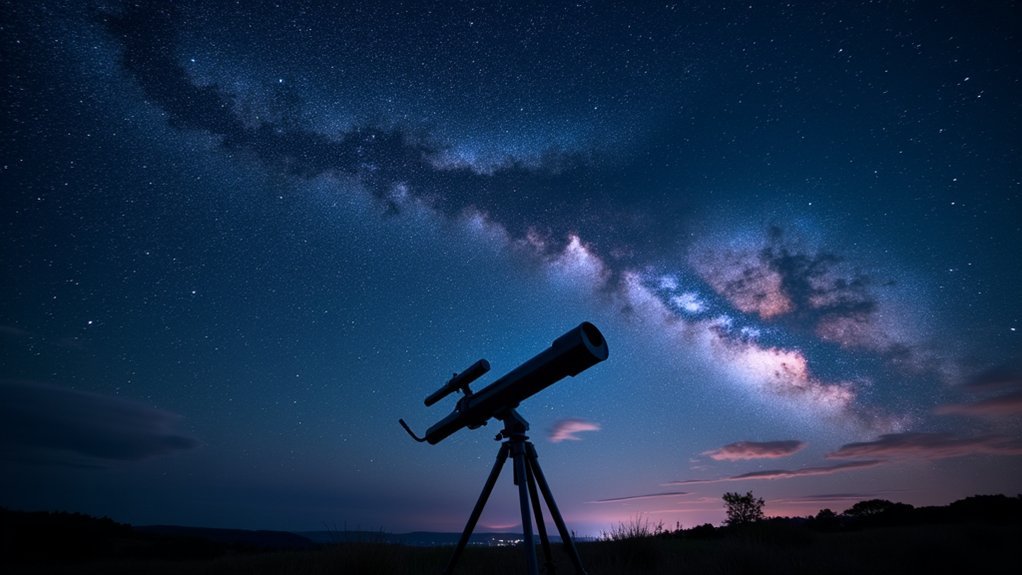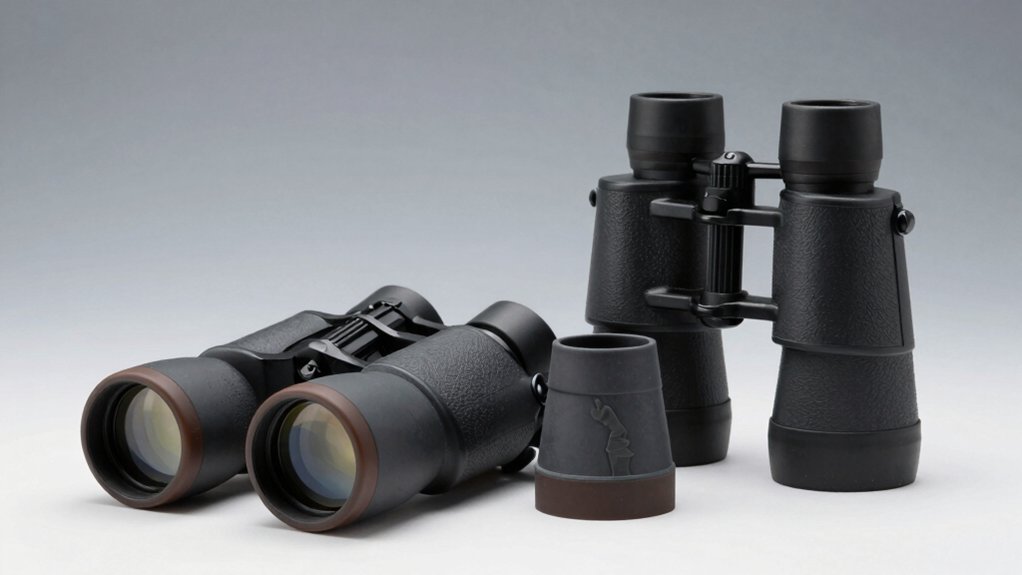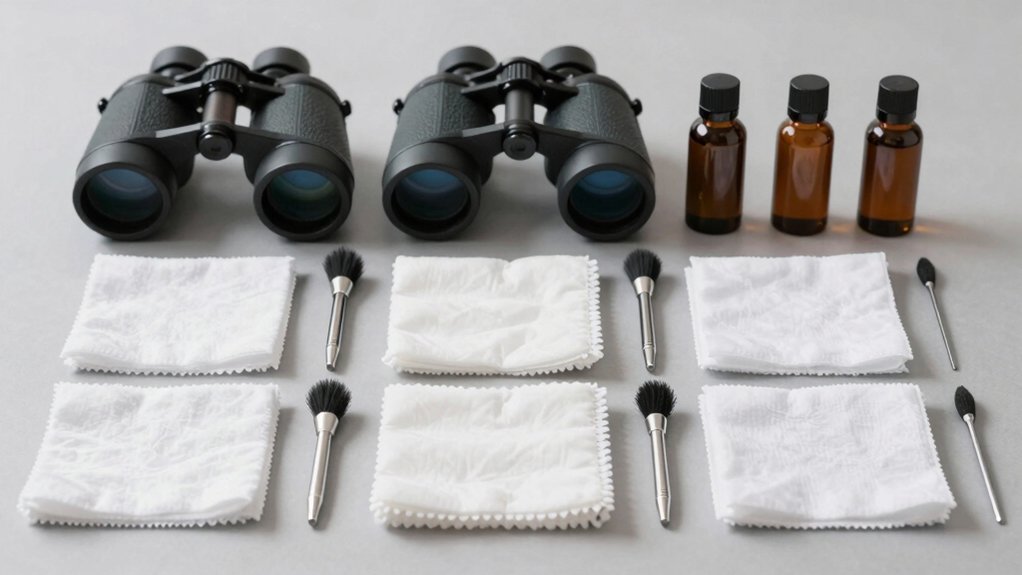When asking your first astronomy questions, head to thriving communities like IceInSpace, Cloudy Nights, or Reddit’s r/astronomy. These forums offer dedicated beginner sections with thousands of helpful posts about equipment, observing techniques, and setup advice. You’ll find supportive members enthusiastic to guide your cosmic journey, specialized sub-forums for your specific interests, and structured knowledge bases. Learning how to craft effective posts will dramatically improve the quality of responses you’ll receive below.
Popular Astronomy Forums to Kickstart Your Cosmic Journey

Where can you turn when the cosmos beckons but you’re not sure where to begin? Several thriving online communities stand ready to guide your first steps into astronomy.
IceInSpace offers a dedicated beginners section where you’ll find over 20,000 members enthusiastic to answer your Deep Space questions.
Explore the cosmos with IceInSpace, where thousands of stargazers stand ready to illuminate your astronomical questions.
Similarly, Cloudy Nights boasts an impressive 302,700+ posts in its Beginners forum, making it an excellent resource for equipment advice and observing tips.
For structured General Help, try Astronomy Stack Exchange‘s Q&A format or join the Astronomical Society of the Pacific‘s forums for educational resources.
Don’t overlook Reddit’s r/astronomy community, where you can discuss everything from observational techniques to equipment recommendations in a friendly, accessible environment.
Your cosmic journey doesn’t have to start alone.
Community Features That Support Newcomer Questions
Once you’ve chosen a forum to join, you’ll discover specialized features designed to welcome astronomy beginners. Most forums offer dedicated sections like “Getting Started General Help and Advice” where over 267,900 posts await your exploration—proof you’re not alone in your questions.
You’ll find introductory threads where you can introduce yourself and receive personalized guidance tailored to your specific interests. Community engagement thrives through these supportive spaces where experienced astronomers readily share their knowledge about equipment selection and observational techniques.
Whether you’re curious about astrophotography or struggling with your first telescope setup, these forums provide structured environments where your questions receive thoughtful responses.
The combination of equipment discussions, observational tips, and personal experiences creates an invaluable knowledge base that’ll accelerate your progress in astronomy.
Finding the Right Sub-Forum for Your Specific Astronomy Interests

When you’re traversing the vast universe of astronomy forums, finding the perfect sub-forum can dramatically enhance your learning experience.
Navigating astronomy forums strategically connects you with the exact knowledge and community you need for stellar discoveries.
Most astronomy communities organize their discussions into specialized categories that cater to different interests and expertise levels.
If you’re new to stargazing, look for “Getting Started” sub-forums where experienced astronomers offer guidance on telescope selection and observational techniques.
Equipment enthusiasts will benefit from brand-specific discussions where users compare models and troubleshoot technical issues.
For those interested in capturing celestial objects, astrophotography sub-forums provide specialized advice on cameras and processing techniques.
If you’re more interested in observational astronomy, check out “Monthly Guides” and “Observing Reports” sections where you’ll find timely information about upcoming events and first-hand experiences from fellow stargazers.
How to Craft an Effective First Post That Gets Helpful Responses
Making a strong first impression in astronomy forums can greatly increase your chances of receiving quality help.
Begin your post with a specific question or topic—for example, “I need help understanding why Vesta opposes Sun in tonight’s observation.” This clarity immediately signals what you’re seeking.
Provide relevant background such as your experience level and equipment used. “I’ve Started General Help topics before, but this planetary phenomenon confuses me” gives responders context to tailor their advice.
Always maintain a courteous tone and show appreciation for assistance.
Use appropriate categories or tags like “Asteroid Observation” or “Solar System Events” to direct your question to knowledgeable members.
Before posting, search existing threads—your question might already have detailed answers waiting.
Evaluating Advice From Forum Members: Separating Facts From Opinions

How can you determine which advice to trust in astronomy forums? With hundreds of users ever online, filtering quality information from personal opinions requires critical thinking. Always verify advice through credible sources aligned with mainstream science before making decisions based on forum recommendations.
- Look for members with established expertise and extensive posting history.
- Cross-check forum advice with scientific resources and educational materials.
- Consider potential biases when equipment or specific approaches are recommended.
- Engage with multiple forum members to collect diverse perspectives.
- Recognize that personal anecdotes, while valuable, don’t replace empirical evidence.
Remember that even the most well-intentioned forum members may share subjective experiences rather than universal truths. By approaching forum advice with healthy skepticism, you’ll develop a more accurate understanding of astronomical concepts and practices.
Frequently Asked Questions
What Are Good Questions to Ask About Astronomy?
You’ll make the most of astronomy discussions by asking about beginner telescopes, constellation identification techniques, recommended learning resources, astrophotography tips, and upcoming celestial events. These questions build practical knowledge for your stargazing journey.
What Is the Best Astronomy Website?
You’ll find Sky & Telescope offers the best balance of resources for astronomers at all levels. It combines in-depth articles, observing guides, equipment reviews, and an active community forum all in one place.
What Is the Hardest Question in Astronomy?
The hardest question in astronomy is likely dark matter’s true nature. You’ll find cosmologists still can’t explain what comprises roughly 27% of our universe, despite decades of research and observation efforts.
How to Learn Astronomy for Beginners?
You’ll learn astronomy best by starting with library books, observing with binoculars, using star charts, joining online communities like Cloudy Nights, and practicing regular night sky viewing. Online courses can supplement your hands-on experience.
In Summary
You’ve now got several excellent options for starting your astronomy journey online. Don’t hesitate to join these welcoming communities with your questions. Remember to search before posting, be specific when asking, and approach advice critically. The universe is vast, but these forums make it more accessible. Your cosmic adventure is just beginning—take that first step and connect with fellow stargazers today.





Leave a Reply